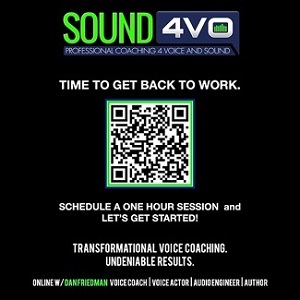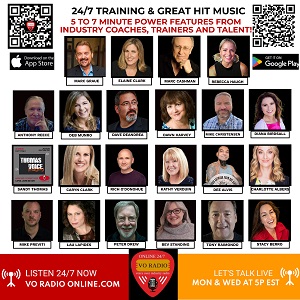|
Demos: Your Top 10
FAQs - And Answers!
By David Goldberg  As both a training and production facility, we at Edge Studio get a variety of questions on a daily basis, and many of these questions concern demos. As both a training and production facility, we at Edge Studio get a variety of questions on a daily basis, and many of these questions concern demos. So we have compiled what we consider to be the top 10 most frequently asked questions, along with some helpful answers. Here they are, in no specific order.
1. HOW LONG SHOULD MY DEMO BE?
In most major markets, demos receive the greatest response when they're between 45 seconds and 1.5 minutes in length. Anything longer than a minute and 30 seconds is too long.
Why? It only takes a producer that long to decide if you are right for what they are looking for.
If you are thinking, “What if my demo has character work, narration, commercial work, and more? Shouldn’t it be longer?”
Yes … and no. The entire demo itself can be longer than 1.5 minutes, but each individual track on the CD should be no longer than that. If you do work in more than one area - for instance - commercial, narration, character - you should have separate, clearly labeled tracks on your demo CD for each different demo.
2. WHAT TYPE OF DEMO SHOULD I MAKE? This depends on your specific interests, and the types of materials you read best. First, know the three types of demos: Commercial: Due to the “glamour” of being heard on national television commercials, this is the most popular type of demo, even though only 10% of the work is commercial work. A commercial demo demonstrates a variety of different kinds of commercials. For example, conversational, hard sell, nonchalant, public service announcement, etc.
Narration: To work full-time in this industry, it is generally necessary to have a narration demo, since narrations comprise 90% of the work.
This demo demonstrates a variety of different kinds of narrations. For example: audiobook, documentary, voice mail, web site narration, children’s educational film, etc.
Specialty: This is a demo that serves one industry niche, making it easier for you to obtain work in one specific segment of the industry. For example, a “nature-film voice-over demo” increases the chance of being hired by a nature-film producer.
Other specialty demo types include character, audiobook, foreign language, children’s work, and so on.
But beware: It’s difficult to obtain other types of work with this demo alone. Most professionals market with at least a commercial and narration demo. This allows you to obtain both types of work, and to not limit yourself.
Yet adding a specialty demo can give your marketing efforts a head start in a specific sector. And once you gain this experience, it may be easier to obtain other types of work.
3. WHERE DO I GET DEMO SCRIPTS? Any producer who specializes in the production of demos should offer a vast supply of scripts. However, make sure this supply is large enough to avoid putting the same scripts on all demos.
An alternative is to obtain your own material. You can even write your own scripts, but be sure your writing skills are professional. Read your scripts to others and for opinions.
Many professionals use material from magazines, commercials, documentaries and the like, without the author’s consent. We cannot recommend this practice as legal.
Moreover, it is essential for the material to show a range of your talent. If it does not, obtaining work can be more challenging.
4. CAN I USE COPYRIGHTED MATERIALS?
While professional voice-over artists use excerpts of professional jobs on their demos, newcomers must create a demo by recording artificial excerpts. And unless you are an excellent copywriter, you will need to use copyrighted material.
The question as to whether someone else’s copyrighted material can be used on your demo is important. So we did some research. What we found indicates that most material can be used without requiring the author's permission.
The most compelling reason for this is the "Fair Use Act" law, which indicates that copyrighted material can be used, without permission, as long as it is not being directly used to make a profit.
To confirm our findings, we asked the legal department at AFTRA - a union for actors and voice talent - if it is okay to use copyrighted text on demos. The answer: “No problem at all.”
5. WHAT REALLY GOES ON A DEMO? Demos contain small segments of work called “spots.” Each spot showcases a different style of delivery.
For example, one spot may show an upbeat style, another spot may show a serious style, and so forth. By demonstrating a greater variety of spots on your demo, there is more chance that a producer will hire you. This is because you show the producers that you are capable of varied types of work.
A spot is generally five to 15 seconds of an original recording - regardless of whether the original was a 60-second radio commercial or a three-hour-long documentary.
Most professionals put all their demos on one CD.
For example, track 1 may be the commercial demo, track 2 narrations, etc. Duplicating the demo onto single CDs costs the same regardless of the number of demos on the CD.
And of course, it costs no more to mail a CD with one or more demos on it to prospective clients. So really, the only consideration when choosing to produce one or two demos is the one-time cost of producing them. But if you obtain even one additional job due to multiple demos, the effort will probably pay for itself.
6. WHO SHOULD RECORD MY DEMO? Well, you must work with a producer who specializes in voice-over. In fact, it goes beyond that.
There must be a synergistic relationship between you and the producer. If you are not 100% relaxed and confident with the producer, your demo will not reach its fullest potential.
Just any producer will not do. You need one who specializes in the production of demos. Some produce voice-over but do not work on demos. Others specialize in music production, and they will probably not possess the skills necessary to put together a voice-over demo.
So look for a producer who:
7. WHAT FORMAT SHOULD MY DEMO BE?
Your demo should be on CD. Not cassette, not reel-to-reel, nor any other unpopular format. This includes vinyl records and 8-tracks. Popular digital formats include MP3 files, Real-Audio, Windows-Media, and other digital files. Demos, short for "demonstration," should not be called a "demo-tape" (from the old days of cassettes) or "reel" (from the days of reel-to-reel tapes).
8. HOW MANY COPIES OF MY DEMO DO I GET? At most studios, when the mixing and mastering of your demo is completed, you will get two copies. One will be for you to keep in a safe place. The second is for you to send to a duplication house. A duplication house is a business that works specifically in mass producing media, such as demo CDs. Prices for duplication will vary, but having a few hundred copies of your demo to send to casting agencies and production facilities will greatly increase your marketability.
9. WHAT ARTWORK SHOULD GO ON MY DEMO?
This one is all you. You want your demo to stand out, but not necessarily to scream. Your artwork should:
As to who should do the artwork, you can do it yourself, you can have a consultation with a voice coach who knows their marketing.
Many duplication houses can even help you choose artwork for the cover, spine, inside jacket, as well as the CD itself.
Having said that, you want to make sure the artwork on the CD matches the artwork on the cover, at least in style. Maintain consistency.
10. WHEN SHOULD I UPDATE MY DEMO?
This is a tricky question, as it depends on the specific talent. If your demo continues to get you the amount of work you are looking for, don’t change it!
Many voice-over talents keep themselves busy with the work they get from their demos, but for some reason, want to spend money re-doing that demo. But do this only when you want to record a different type of demo, or if your voice has changed.
Another reason to update is to add in spots from jobs you have recorded. This is less expensive than recording an entirely new demo, and demonstrates the variety of your talent. But remember, just any old spot you’ve recorded should not be on your demo. Demo spots should reflect how good a voice artist you are, and the range of your talent.
Neither does a cheaply-recorded, poorly-produced spot belong on your demo.
David Goldberg is owner of Edge Studio, the voice-over production, career-building and casting company with facilities in Connecticut (Fairfield County), New York City, and near Washington, D.C. One of the most active voice-over producers in the U.S., he began Edge Studio in 1988 and works with voice talent, both as private instructor and producer. "Students benefit from his straight-forward, detailed production and acute ear."
Email: info@edgestudio.com
Web: www.edgestudio.com
|
|
|
With Sean Daeley and Paul Stefano - check it out!
Inspiring interviews help your VO career
For essential voice-over business strategies
Get your bi-weekly dose here ... all things VO!
As of the NEW website launch, 03/22/2012




.png)




Howard Ellison.